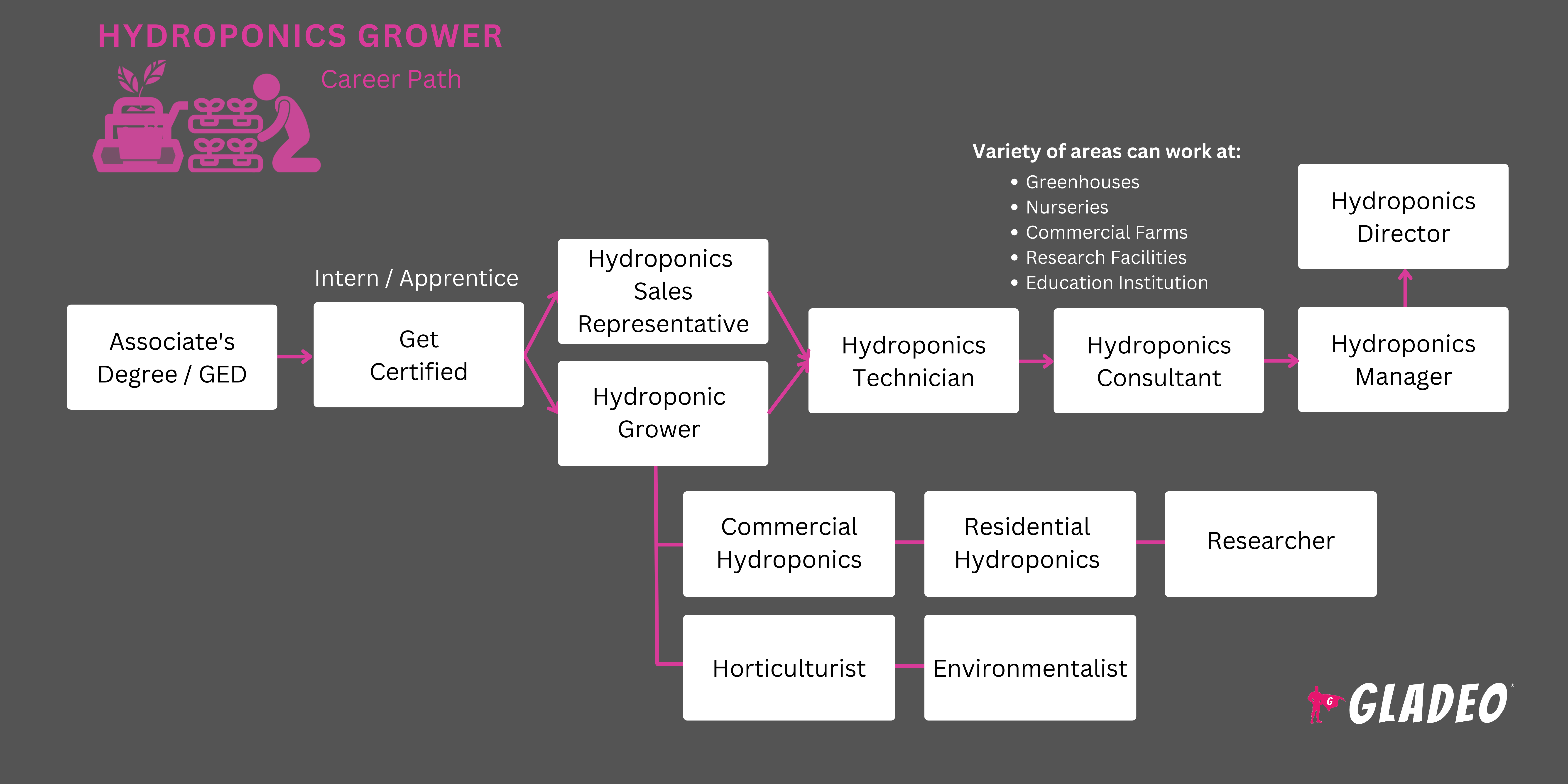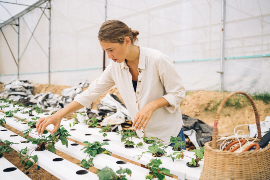스포트라이트
Hydroponic Grower, Hydroponics Farm Manager, Hydroponics Technician, Hydroponics Researcher, Vertical Farming Specialist, Controlled Environment Agriculture Specialist, Hydroponics Consultant, Indoor Farming Manager, Hydroponic Crop Production Manager, Greenhouse Grower
As strange as it may seem, not all plants require soil to grow. Instead, they can get the nutrients they need through special nutrient-rich water that delivers essential elements directly to their roots!
To accomplish this requires the work of trained Hydroponic Growers who can set up and maintain soilless growing systems in carefully controlled environments. Many growers work for greenhouses, farms, or retailers growing herbs, fruits, and vegetables such as lettuce, tomatoes, cucumbers, and other leafy greens.
Hydroponic Growers monitor water quality, nutrient levels, and environmental conditions such as temperature and humidity to help plants grow healthy and strong. They perform regular checks on the growing system’s pumps, filters, and lighting to make sure everything is working correctly so they can achieve a successful harvest.
- Getting to spend time peacefully working with fruits, vegetables, and other plants
- Knowing your work provides resources for food, medical, or wellness products
- Helping the environment through efficient use of water and reduced use of land and chemicals
근무 일정
- Hydroponic Growers may work full or part-time. Since indoor controlled systems use artificial light, growers may work night shifts at 24/7 operations such as commercial hydroponic farms.
일반적인 의무
- Assemble soilless growing systems, including growing beds, reservoirs, and pumps
- Inspect system components on a regular basis to ensure they are operating within parameters
- Calibrate lighting, irrigation, and climate-control systems
- Ensure consistent, even exposure to light
- Make sure suitable temperatures and humidity levels are maintained at all times
- Determine proper nutrient solutions for optimal growing conditions. Review pH levels and electrical conductivity of solutions
- Monitor plants for signs of nutrient deficiencies, diseases, or exposure to pests
- Start seeds and clones, then move them to hydroponic systems when ready
- Trim and prune plants to boost growth
- Carefully harvest mature plants without disturbing other crops
- Keep detailed logs of all plant development and any problems
- Analyze data to assess ways to boost yields for future growing
- Use non-toxic or approved pesticide control measures
- Apply preventative treatments to avoid plant diseases
추가 책임
- Keep growing areas and tools clean to prevent disease and pests
- 재고 요구 사항을 결정합니다. 공급업체, 도매업체, 현지 재배업체의 재고를 찾아 구매하세요.
- Manage inventory. Keep track of supplies like nutrients, growing media, and spare parts
- Train and supervise extra staff, as directed
- 들어오는 재고 배송을 오프로드하세요. 모든 재고를 추적하여 재주문 시기를 파악하세요.
- Keep up-to-date on technology and procedural updates
소프트 스킬
- 정확도
- 분석
- 세부 사항에주의
- 디테일 지향
- 독립의
- 이니셔티브
- 조직적
- 모니터링
- 조직
- 끈기
- 믿음직한
- 예약
- 건전한 판단과 의사 결정
- 시간 관리
기술 능력
- Ability to lift and carry up to 25 lbs.
- Ability to pass a background check, as needed
- 장시간 서 있고, 앉고, 구부리고, 무릎을 꿇을 수 있는 능력
- 기본 산술 및 컴퓨터 기술
- 기본 연구 및 측정 기술
- Databases and analytics programs for plant health information
- 우수 제조 관리 기준 숙지
- Knowledge of hydroponic operations, IT interfaces, and systems troubleshooting
- 최소 연령 21세(일부 직무의 경우)
- No (or manageable) allergies
- Tolerance of relatively high temperatures and humidity
- 유효한 운전면허증(일부 직종의 경우)
- Community gardens
- Controlled environmental habitats
- 농작물 생산 시설
- Education and research sites
- Greenhouses
- 식료품점 및 소매점
- Indoor and vertical farms
- 보육원/잔디 및 정원 소매업체
- 자영업
- Urban buildings (for rooftop gardens)
Hydroponic Growers face various demands in their profession. They must consistently monitor systems, checking variables like water, nutrients, and pH to ensure optimal plant growth. Technical understanding of their setup is essential, coupled with the ability to solve problems quickly and an ongoing commitment to learning as technology and techniques progress.
They may work with plants used for food, medicines, and wellness purposes. Like any product that will be consumed by people, such plants must be handled in strict accordance with various regulations. This may require maintaining specific environmental conditions while wearing protective gear and closely following standard operating procedures.
Growers stay physically active, often standing or stooping for much of the day. They may need to lift and carry plants and system components around. If working inside greenhouses they often have to deal with hot temperatures and high humidity!
The hydroponics industry is experiencing significant growth these days! This has led to increased adoption of technology and automation because growers want to optimize their yields and resource usage. Smart systems that can monitor and adjust environmental variables in real time are helping with that. These systems, often integrated with AI, enable precise control over factors like nutrient levels, pH, and lighting.
Another trend is the surge in urban and vertical farming. Hydroponic methods provide a feasible solution for farming within city limits, even on rooftops. This reduces pollution caused by transporting produce long distances and ensures fresher produce for urban consumers.
Hydroponic Growers may have always had a “green thumb,” loving to work in their own gardens or tending to indoor houseplants. They may have enjoyed the relaxation that comes from working with plants. They are patient and meticulous, traits that could have come from any number of childhood experiences!
- Some Hydroponic Growers have a bachelor’s degree in horticulture, plant science/botany, crop science, or agriculture, but that is not always needed to get started
- Students considering college should look for programs offering a minor or area of specialization in hydroponics
- For those interested in the technical aspects of hydroponic systems, agricultural engineering or bioengineering may be suitable major options
- Many workers gain entry-level experience through workshops or community college classes about hydroponics and growing soilless plants indoors
- Applicants should ideally have some working knowledge of basic plumbing, HVAC and environmental control systems, plus a general aptitude with mechanical and electrical systems
- Students might want to focus on one or more of the standard systems for hydroponic production, such as wick systems, water culture, nutrient film technique, drip systems, aeroponic systems, Dutch buckets, and ebb and flow
- Learners can gain skills through ad hoc online courses from Udemy, HortCourses, Alison, Skillshare, Vertical Farming Academy, and other sites
- A college degree isn’t required for this career field, but online, vocational school, or associate’s degree-level courses may be helpful. A bachelor’s may be preferred by some employers
- 수업료, 할인 및 지역 장학금 기회 비용을 고려하십시오 (연방 지원 이외에)
- Check out Seed Your Future’s list of scholarships
- 캠퍼스, 온라인 또는 하이브리드 프로그램에 등록할지 여부를 결정할 때 일정과 유연성에 대해 생각해보십시오.
- 해당 지역의 사설 플라워 스쿨이나 온라인에서 수업을 듣는 것을 고려해 보세요!
- Hydroponic Growers should have a basic understanding of botany. If your school features a gardening or agricultural program, sign up
- Nothing beats hands-on practice, but many hydroponics principles can be learned online or through reading magazines and books
- Check out articles, blogs, and videos by hydroponics YouTubers like Everest Fernandez and Jeb Gardener
- Consider taking ad hoc online courses from Udemy, HortCourses, Alison, Skillshare, Vertical Farming Academy, and other sites
- Try to learn about as many soilless plant types as you can, but also decide if there is a particular type of hydroponics you want to specialize in
- Learn about the different commercial and home-based systems and equipment involved
- 아르바이트를 신청하거나 무료 교육을 받는 대가로 자원봉사를 신청하세요.
- 업무 이력서를 작성하여 업무 및 학업 성취도를 추적하세요.
- Start your own hydroponics garden at home!

- 인디드닷컴에서 채용 공고와 크레이그리스트에서 현지 채용 공고를 찾아보세요.
- Research possible employers in your area, such as local greenhouses, grocery and retail stores, nurseries, controlled environmental habitats, vertical farms, etc.
- Try to find out if they have hydroponics operations and if so, who manages them. If you don’t see a job posting, touch base with them to see if they have any projected openings in the near future
- Visit local farmer's markets and get to know vendors. See if they know about anyone hiring hydroponics growers!
- Take hydroponics-related classes and get acquainted with your fellow students. Grow your network and let them know when you’re looking for work
- Talk to your school’s career center about help with resume writing, interview preparation, or job searching
- Reach out to people you’d like to list as personal references and ask them for permission to share their contact info
- 대학 학위가 없는 경우, 수업을 듣고 자격증, 준학사 또는 학사 학위를 취득하는 것을 고려하세요.
- 자신이 근무하는 곳의 모든 '비하인드' 프로세스에 대해 알아보세요. 상사에게 추가 업무를 기꺼이 수행할 의사가 있음을 알리세요. 자신을 필수 불가결한 존재로 만들어 보세요!
- 비즈니스에 도움이 될 수 있는 특별한 전문 수경 재배 기술이나 시스템을 배울 수 있는지 물어보세요. 교육을 받을 의향이 있음을 알리고 수업료 지원을 제공할 수 있는지 문의하세요.
- 정시에 출근하고 관리 중인 식물을 잘 돌보세요.
- Closely monitor plants for signs of disease, pests, or malnourishment
- Work well with others and train new employees to a high standard. Remember that many of the plants you’re growing will be eaten or otherwise consumed
- 항상 안전 수칙을 준수하고 필요에 따라 장갑이나 보안경을 착용하세요.
- Stay up to date on trends and continue to learn about new systems, methods, and best practices
- Engage with professional hydroponics organizations like the Hydroponic Society of America. Attend meetings and events to learn and make connections
- 도매업체 및 공급업체와 같은 공급업체와 강력한 관계 구축
- 적절한 시기가 되면 더 높은 연봉이나 더 나은 승진 기회를 제공할 수 있는 대기업에 지원하는 것도 고려해 보세요.
웹사이트
- 미국 원예 과학 협회
- 미국 식물 생물학자 협회
- Aquaponics Association
- Epic Gardening
- Garden Culture Magazine
- GEEKGARDENER
- Hydroponic Society of America
- Reddit subreddits such as r/hydro and r/Hydroponics
- Science in Hydroponics
책
- Aquaponics for Beginners: How to Build your own Aquaponic Garden that will Grow Organic Vegetables, by Nick Brooke
- DIY Hydroponic Gardens: How to Design and Build an Inexpensive System for Growing Plants in Water, by Tyler Baras
- Hydroponics and Greenhouse Gardening: 3-in-1 Gardening Book to Grow Vegetables, Herbs, and Fruit All-Year-Round, by Richard Bray
As Grandview Research notes, the global hydroponics market is expected to grow by 20.7% through 2028, due to the “increasing use of hydroponic systems for the indoor farming of vegetables.” So the demand for Hydroponic Growers should remain steady. But if you want to explore a few related career fields, check out some of the below options:
- 농업 및 식품 과학 기술자
- 농업 경제학자
- 생태학자
- 환경 과학자
- 부지 관리 작업자
- 원예사
- 조경가
- 자연주의자
- 살충제 처리기
- 식물 생물학자
- 토양 과학자
- 포도밭 관리자
뉴스 피드

주요 채용 정보

온라인 과정 및 도구







